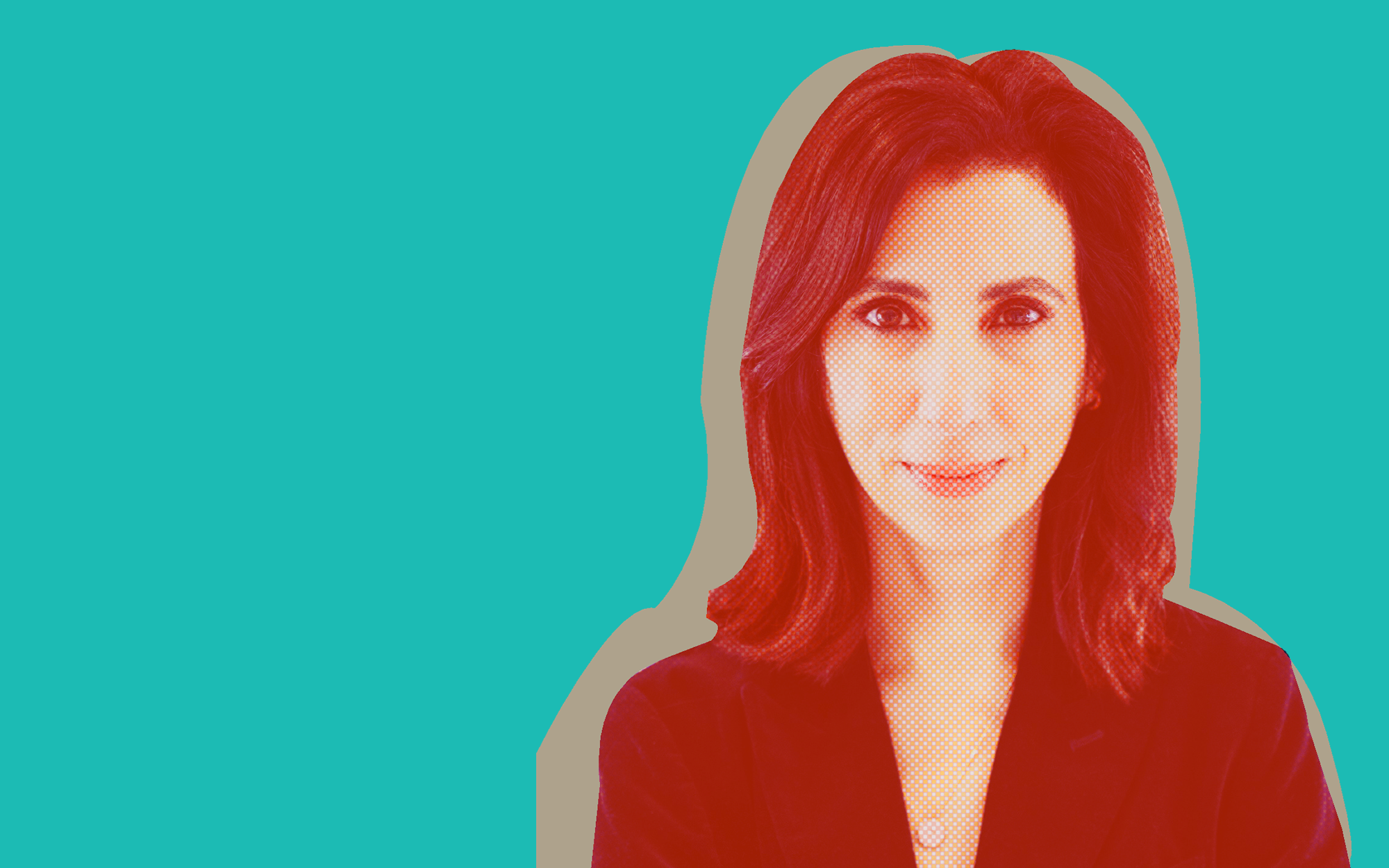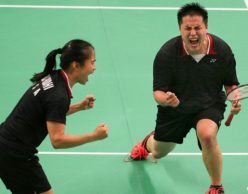Aline Brosh McKenna On Leading Ladies

Aline Brosh McKenna is a Hollywood triple threat; she’s a showrunner, director, and writer and she does them all really really well. She has worked in this business for more than two decades but her mission has remained the same: to center women’s stories around something other than a man. We talk about Cher, body hair, bacterial vaginosis, and so much more. Get ready!
She’s the writer of your favorite rom coms, from 27 Dresses to The Devil Wears Prada to I Don’t Know How She Does It. Most recently she has been busy showrunning and writing Crazy Ex-Girlfriend which is now in its fourth and final season.
Aline tells us what it was like growing up in the 70’s in very white suburban New Jersey with Jewish immigrant parents, and why she relates more to people with immigrant parents than other Jewish people. She tells us about the differences between being a boss in her 20’s and being a boss in her 40’s, and why she wants to write more roles for women over 50.
An Edited Transcript Of Our Convo:
Amy S. Choi: Okay, so we have a legit Hollywood person on the show today. Aline Brosh McKenna has given us so much good film and television over the last 25 years. She’s a showrunner, a director, an actor, but she’s probably most famous for being a writer. She wrote 27 Dresses, I Don’t Know How She Does It, and maybe a little movie you know called The Devil Wears Prada.
Rebecca Lehrer: Oh, I love that movie. For the last four years, she’s been at the helm of undoubtedly the most Jewish show on TV, and a very mashy one, Crazy Ex-Girlfriend. Give me a song about bacterial vaginosis in the style of the musical Cat, and I am sold, S-O-L-D, sold. Or one about giving good parent, being the kind of person other people’s parents love. That’s me. (music)
Amy S. Choi: You know, my favorite is her song about antidepressants. I mean, don’t be such a basic bitch about your antidepressants.
Rebecca Lehrer: Everyone should take them. Yeah.
Amy S. Choi: Along with her co-creator, Rachel Bloom, Aline has managed to make a smart, funny, witty show that is super mashy.
Rebecca Lehrer: Super mashy, and she comes by it honestly. Aline moved to America when she was less than one year old, from France, and is a Mash-Up of Sephardic and Ashkenazi Jewish heritage. She grew up in a very white suburb of New Jersey in the ’70s, and as she tells it, she and her family really stood out.
Aline Brosh McKenna: I was very hairy. I continue to be hairy, but I was a really hairy little girl. Got heavy arm and leg hair really young, and then a lot of eyebrows.
Rebecca Lehrer: This is an important mash-up theme, hair.
Amy S. Choi: Yes, we have a whole article dedicated, on our website, to hair.
Aline Brosh McKenna: So, it was a whole thing, and it really marked me as different, and kids felt very open about commenting on it. And also, it’s interesting. I have a big nose, but I don’t have a quote/unquote “stereotypical” Jewish nose, hook nose. Hate to say that, but that’s the stereotype. And it’s actually not until very recently that I would start googling Sephardic women or Moroccan women or North African women and see, “Oh, it’s that nose,” and a lot of the things that I was shamed for as a child in terms of my appearance, I realized later in my life were related to my ethnicity, but I didn’t identify it that way when I was a child. I just identified it as like, “Oh, people think I’m not conventionally pretty.”
Rebecca Lehrer: When you have met anyone who is Moroccan or Northern African, have you been like, “Whoa, there’s a thing here that we share that I didn’t realize I thought was Jewish but maybe is just actually North African?”
Aline Brosh McKenna: I have that more often just with anyone who has immigrant parents, because that really is what defined my existence. It just so happens that my mom is French and my dad’s Israeli, but really what it was, they were older. My mother is a Holocaust survivor. My dad fought in the war in Israel. They had different life experiences from my parent’s friends. My dad was 37 when I was born. My mom was 35. So, we were living in the suburbs. Most people have moms who are wearing the right polyester stretch pants, and they’re in a station wagon or smoking out the window with their press-on nails, and my mother is so different.
My mother has her hair up in a bun and is wearing an Hermes scarf, and she is really clinging to her culture. French people are not eager to assimilate. They kind of don’t care. They’re really very French. My dad’s Israeli. Israelis are a lot more like Americans, and he assimilated very well and lost his accent pretty well, and there’s a kind of a similarity in the, you know, “Get your shit done and suck it up” idea in Israeli culture so he blended well. But my mother, the prototypical story is that my mother hates Halloween. French people don’t understand Halloween. She thinks that kind of candy is disgusting. And so on Halloween, my mother decided one year to, and this is a true story, to slice up red and green peppers and put them in a Ziploc bag and hand them out. And when I saw what was going down-
Rebecca Lehrer: What year was this?
Aline Brosh McKenna: This is like 1975 or 6, and when I saw what was going down, I flung myself in front of the door, weeping, and said, “I’ll never recover from this,” and “Why can’t you get the big Snickers?” And a lot of my identity and a lot of personality really is formed by the idea that, my parents don’t actually understand what’s the what, and it’s funny, because when I then moved on to other environments where there were lots of Jews, like show business, that sense of otherness really dissipated in some ways. But where it continues is that a lot of Jews identify with the sort of Borscht Belt, Matzah ball Jewishness, and my parents have literally no comprehension of that. They don’t understand that kind of humor. All those kind of typical Jew-y things, Woody Allen, makes no sense to them.
Rebecca Lehrer: We talk about this all the time. As I was coming here and Amy and I were talking, we were prepping, it’s one of the things we wanted to talk about, because Amy grew up in a suburb of Chicago that was actually primarily Jewish.
Amy S. Choi: All Jews. Really wished I was Jewish.
Rebecca Lehrer: But those Jews, my experience as a first-generation American Jew, like Salvadoran Jew, it has nothing to with me, other than we did the same prayers.
Amy S. Choi: There were no Israelis where I grew up.
Rebecca Lehrer: Or even like diaspora, like recent diaspora Jews. They were multiple-generation American Jews. It’s such a different experience.
Aline Brosh McKenna: All of these things are like a whole thing, and then that intersects with your dispositions. Like my brother was super good looking and popular and kind of looked like John Travolta and managed to make that thing work for him.
Rebecca Lehrer: Was he your older brother?
Aline Brosh McKenna: Older. Yeah, and he was very dashing and good looking and athletic and popular. I mean, he had pennies thrown at him in the locker room in ninth-grade football, and we had a fair share of garden-variety antisemitism. Cher was my guiding light, the existence of Cher.
Rebecca Lehrer: I was watching Watch What Happens Live, Andy Cohen, and he somehow threw out that Cher and Kim Kardashian should go to Armenia together, and I was like, “I do hope that happens.”
Aline Brosh McKenna: Yeah, I think what’s interesting is that both Cher and Kim Kardashian have altered their appearance somewhat to be a little more conventionally, to have more conventional features, like even just raising a hairline or that sort of thing, but who Cher was in this early ’70s when she had her show, she really, that was the closest face shape that I recognize in people who are famous. As much as I wanted to be Jacqueline Smith, that wasn’t quite going to work. And so I always looked for … I just had a strong sense of that the traditional female narratives pertaining to female identity and romance and stuff were not going to exactly pertain to me because I was perceived as not the garden-variety female.
And then the other factor was I was really, really smart, and again, I would not describe the ’70s as looking for really super smart, hairy little girls. Flat chested. But all those things, which marked me as different, now I feel very proud about and obviously, being smart serves one well. There was heavy pressure to be ashamed of all the things which I think actually make me special and interesting and cool.
Amy S. Choi: What you’re saying here is that, we think a lot about how as Mash-Ups, we’re like, we look, I don’t know, dare I say, regular white people, and we’re like, “It must be so … It’s kind of sad that you don’t have all of these traditions and stories to draw on,” and we feel so lucky to have the incredible tapestry that you have just made of your family stories. You have so much to draw from, and also of all of these traditions and experiences. But as you say, it can be incredibly alienating, and we also carry all their trauma, right?
Aline Brosh McKenna: Yes, of course, on a genetic level, and the thing is, I do, I enjoy white privilege. I look white, and so I looked brown and hairy enough when I was a child that it was an issue, but that’s mainly because everybody else had strawberry blonde hair and freckles where I was growing up. And then as soon as I got around Jews … I remember the first time someone told me I looked Jewish, I was like, “What do you mean?” and then when I got around Jews, it was like, oh, brown-haired girls with biggish noses.
I fit in pretty well, but again, it would be a thing where women like that would approach me with, “We’re similar. We’re similar,” and I was like, “No my mom did not go to Brandeis. She doesn’t know anything about that. I mean, my refrigerator was filled with steamed leeks and halvah, and so god forbid anybody should come to my house and open the flipping fridge. That was really where I felt like I occupied a weird space, was people treat you as if you’re white, and so you are white, and you would enjoy all those white privilege, but I always felt a little … The situation’s a little more nuanced than that, as we say on the show. It’s a little more complicated than that, and so sometimes I just don’t get it. And also, it’s differences that are invisible to most Americans.
Amy S. Choi: When did that turn for you? When did it go from being like, “Oh no, the steamed leeks in the fridge,” to being like, “Fuck yes, steamed leeks in the fridge”?
Aline Brosh McKenna: I’m sure this is a theme on our show, but I have fought my hair my whole life, and so there was a phase when I was 16 where I grew my hair super long and I let it be super curly, and it was like really long and really big. And basically what happened was — this tells you a lot about me — it started to work with boys, and so I started to cultivate this artsy, ethnic-y look. It was lace stockings and mini skirts and big tuxedo jackets, like wild hair and huge earrings, and it started to get me male attention. And as sad and shallow as that is to say, I started to glimpse a little path forward. Because it’s very difficult to be feeling like, “God, I’m not Cheryl Tiegs. How is this going to work?” And that’s when it really started.
Rebecca Lehrer: For me in college it was the same thing. It’s like getting there. All of my best friends are also first gen, and whereas like going to the Hillel, I was like, “I don’t relate to this,” even though I went to private school in L.A. in a very Jewish environment. I was like, “Wait, that person blow dries their hair every day?” Until senior year it became cool to have curly hair, and they had curly hair for the first time, and I had no idea. I was like, “That’s what somebody does every day?” My mom gets her nails done and does her hair, but that didn’t translate to something we would do at home for me to do. We had Costco underpants. There was nothing fancy. That was not the thing where we were spending energy, and so in college, I was just like, I don’t relate to … I’m not going to join the Jewish Students Association. That has nothing to do with my experience.
Aline Brosh McKenna: So that is the interesting dichotomy in terms of my identity. Your identity’s so much your parents, and my father is a scientist, and he’s super smart, and he was really into having a smart daughter. And he pushed, pushed, pushed and really always wanted me to be super academic, and was like, “You’re lazy. You need to do more,” and I had all those typical immigrant, wanting me to be a lawyer, and Harvard was like one of the signature events of his life, was me being at Harvard, and this is a great story. So, there’s 1600 people in a class at Harvard, and I think maybe 400 of them graduate with honors. 150 of those are magna, and then maybe 50 are summa. So, I gradated magna, which is pretty good.
Rebecca Lehrer: I was zero laudes, zero.
Aline Brosh McKenna: Probably top 10%, of the class, I’d say, and that whole weekend, my father was so miserable and upset and crabby, and I said to my mother, “What is going on?” And she said, “He’s just so upset that you’re not summa.”
Rebecca Lehrer: Oh my god.
Amy S. Choi: I can relate to this content.
Aline Brosh McKenna: Right, and then on the other side, my mother can walk into any thrift store and walk out with a fantastic Ungaro outfit that she had gotten for $16. That’s a French thing. That’s also slightly a poor person thing, because my mother had no money. I very much see my heritage as it’s partly the lineage that they come from, but it’s partly the forces that shaped them very particularly, if that makes sense into the people they are, and the fact that my father’s mother went to go and work in a bottle factory and wash bottles so that he could go to a special school.
Rebecca Lehrer: That’s also a value system.
Aline Brosh McKenna: Classic immigrant stuff. But what that really taught me is that everybody lives at the corner of blah and blah.
Amy S. Choi: How were you able to get that specificity into your work? I think that’s something we love when we absorb all of the stuff that you have created. Also, it really, really warms my heart that the first episode of television that you had produced was for our girl Margaret, An all-American Girl, and it so speaks to that ability, like you said, and the commonalities that are there when you just look at the immigrant experience. But I think one thing that we often face, that Rebecca and I, that we’re like working with certain producers or sometimes different distributors that are like, they want the explanatory comma.
Aline Brosh McKenna: Well, I think in our show Josh is Filipino because Vinny’s Filipino, and there’s a very strange thing on television where there have been characters on television shows that are just Asian, and they never tell you what their background is, and I have a friend who was on a show where they would never tell him what his background was. He was just the Asian friend.
Amy S. Choi: Because they didn’t know. They never thought about it.
Aline Brosh McKenna: He would say, “What is his background?” and they just didn’t give anything, and I don’t know. You can’t play that. You have to know. So, we just did a deep dive, and Rene Gube was on our staff, this Filipino, so we had someone there. And in the instances that we haven’t, we brought somebody in, but you don’t need to explain what dinuguan is. You just need to show it, and the audience is going to understand. “Oh, that’s a special food that pertains to his family, and she’s going to learn how to do it.” It’s very meaningful just to have any kind of specificity.
And I will say, what’s changed over the 25 years of my career is before I could not have made any characters explicitly Jewish. Andy Sachs in Devil Wears Prada is certainly Jewish. Sachs is my grandmother’s name, and Lauren Weisberger is Jewish. That’s a story about a Jewish woman, but that’s never mentioned, nor would that have ever been mentioned 12 years ago when the movie came out. And now, we’re writing one of the most unabashedly Jewish female leads, and we’re encouraged to do that. And I think that it is changing in a great way.
Obviously, I think there’s obviously some negativity that has come with raised awareness of people’s non-white guy-ness, I guess. But to me it ultimately redounds to the good because as a writer you can be super specific. We have a rule in our writer’s room. If it hurts anybody’s feelings or offends anyone, it goes out. We’ll come up with another joke. What is hard about that? And in the beginning, some of the writers hesitated to say to me, “I don’t like this joke. This hurts my feelings,” because they had been told in the past that they were being babies or-
Rebecca Lehrer: Overly sensitive.
Aline Brosh McKenna: Overly sensitive, and that comedy should be more important. It’s like, no, why is it more important than someone’s feelings?
Rebecca Lehrer: There’s such as the female experience in it too which is so specific. I mean, last week this friend of mine I was talking about bacterial vaginosis, just generally, no specifics, but then there’s a whole episode about … I mean, I keep laughing so hard about, “Are you frying tilapia in here?” The experience is so gross. It’s so real.
Aline Brosh McKenna: No, it’s not a river fish. Yeah, I mean, we really have embraced that kind of, again, that specificity, because all women know, we’re like, “Oh, that’s a weird itch,” or “That’s a weird discharge.” We just don’t want to talk about it, but we do know! I know a ton about jizz, just from mainstream movies, not from porn. Just from Judd Apatow movies and Seth Rogen content, I know a lot about it, and from growing up in the ’80s with a lot of gross-out stuff. I know a lot about jizz, but no one was ever talking about the clitorises or yeast infections or any of that. In college I wrote a guide. My roommate and I co-wrote a book called A Coed’s Companion, and it was a guide to college for women, and we had a thing on UTIs and a thing on yeast infections, because you couldn’t Google it and no one was fucking talking about any of that stuff.
Rebecca Lehrer: I’m so excited that generationally, the expansion of what we are willing to talk about and totally open to talk about with our friends, that you’re doing publicly.
Amy S. Choi: We’ve talked so much about your work, which we truly just adore, and I think something that when we think about being Mash-Ups, being immigrants, being children of immigrants, is that we’re really proud of our own work ethic and proud of being super achievement-oriented to the point where your dad was depressed that you were not summa. And we also, we know that the obsession with work is both generational and it’s also very American to the point where people are burning out, and we also know that it’s the weight on work is both different and more for immigrants and kids of immigrants.
And we’re all expected to be exceptional in order to be valued here, and we know it’s unhealthy, and yet I can’t help but be proud when I’m like, “Oh, we worked so fucking hard, and we did this thing, and we made this thing,” but also know it’s not healthy and sustainable. So, I wonder for you, as somebody who has worked so hard and done so much and achieved these really incredible things, do you think that your work ethic comes from your parents? Is it something that you hope to pass on to your kids, or do you hope maybe they have a healthier point of view?
Aline Brosh McKenna: Well, I have a completely different way of parenting from my dad, who was the sort of primary value setter, which is he really had a lot of anxiety about making sure that we did well in school. I mean, he had a lot. He was very anxious about making sure that we could succeed, and the interesting thing is that so I have a shirt that says, “I am an immigrant” that I wear sometimes, and I was wearing it and my parents were over, and my father was like, “Why are you wearing that shirt?” And I was like, “Because I’m an immigrant. We’re immigrants, Dad.” He’s like, “No. I mean, yeah, maybe.”
It’s not a part of their identity. When I say to him, he was like, “Why would you work on a show that’s about an Indian girl? What do you have in common with her?” I’m like, “We’re immigrant families.” He’s like, “What?” It’s so interesting how that is part of my identity. Him, zero. His experience is that, but my father’s is not.
Rebecca Lehrer: He was just doing the thing.
Aline Brosh McKenna: He was just doing the thing, man. He needed a job. He was living in Israel. He married a French girl, so they moved to France for a while. Then, he got a job offer in America and he moved to America. I think, in his mind, immigrant is you’re on a boat somehow. He wouldn’t identify those values as that. He might identify them as Jewish. So, my approach to parenting though, is very different, which is I just don’t believe that you can browbeat anyone into being anything that they’re not. And so I feel like I have one kid who does all his homework and one kid who didn’t really do any homework until ninth grade, and they are who they are, and all you can do is explain to them the consequences. Like, “If you’re not going to do your homework, you might not get the grades that you want. If you don’t get the grades that you want, you’ll just have fewer choices when it comes to college, but they’re not my choices. They’re your choices.”
Rebecca Lehrer: You are just wrapping up Crazy Ex-Girlfriend.
Aline Brosh McKenna: Yeah.
Rebecca Lehrer: We’re not going to talk about the antidepressant section, but that’s what we want to talk about, because until we saw it, Amy and I were both like, every day, being like, “Why isn’t this person on antidepressants?” Everybody. So, what’s a story you’re ready to tell now?
Aline Brosh McKenna: I’d like to tell more stories for people my age, because that’s not something that I’ve been doing, and I think there’s a lot of interesting specificity in how specifically women are treated at a certain age.
Rebecca Lehrer: Amy’s obsessed with perimenopause, so we can talk about that too.
Amy S. Choi: Obsessed.
Aline Brosh McKenna: But just in general the transition that you go through as a woman, for better and for worse. I became the boss of a TV show in my mid-40s, and I do think that I had also been a boss when I was young, having produced a few pilots. The way people treat you when you’re in your 20s and the way people treat you when you’re in your 40s, you get some boss-ness by being middle aged, which is really kind of interesting. And you still have people say sexist things to you, but you less have people comment on your butt than you do when you’re in your 20s.
Amy S. Choi: Thank you so much.
Rebecca Lehrer: Amen.
Amy S. Choi: Thank you so much.
Aline Brosh McKenna: Thank you, ladies.
Amy S. Choi: This is incredible, and also, thank you, Cher.
Aline Brosh McKenna: Thank you, Cher. Always!
Rebecca Lehrer: Should we go to the Cher musical on Broadway?
Aline Brosh McKenna: Yes! There’s also there’s ’70s Cher, but then also I would heavily investigate Silkwood Cher, because the hair, the shag.
Amy S. Choi: Also, can we just go to Vegas together for today’s Cher?
Rebecca Lehrer: How about Cher calling in to C-Span and shit talking people? You know she-
Aline Brosh McKenna: Oh, I know, and her Twitter feed.
Rebecca Lehrer: I fucking love her.
Aline Brosh McKenna: Yeah, she’s the best.
Rebecca Lehrer: Cheers to Cher.
Aline Brosh McKenna: Cheers to Cher.





